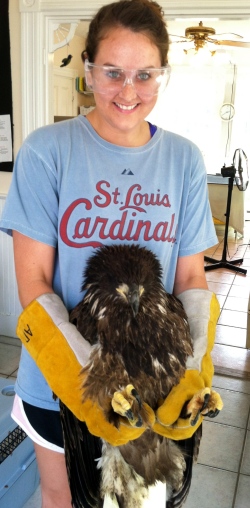Wildlife Rehabilitation Internships on Cape Cod
Annually, Wild Care admits between 900 and 1400 animals, native to Cape Cod, the Islands and southeastern Massachusetts for rehabilitation and orphan rearing. Interns receive training and gain experience in rehabilitation techniques, volunteer management, and public education, from staff and veterinarians volunteering their services.
 Wild Care accepts interns for the spring, summer, and fall of each year. Maximum length of an internship is negotiable, contingent on performance, and is at the discretion of the Director. At this time we are only reviewing applicants prepared to make a minimum commitment of eight weeks.
Wild Care accepts interns for the spring, summer, and fall of each year. Maximum length of an internship is negotiable, contingent on performance, and is at the discretion of the Director. At this time we are only reviewing applicants prepared to make a minimum commitment of eight weeks.
Interns work under the direct supervision of the licensed staff and in cooperation with the Director and other volunteers. The extent of a student’s experience depends on the type of situations presented by the animals admitted, and the comfort level of the intern.
What type of work do rehabilitators do? (As defined by the National Wildlife Rehabilitators Association)
“The work that rehabilitators perform varies considerably. There is no typical description. Paid positions may involve some or all of the following: feeding baby mammals or birds, assisting with fluid therapy and bandaging, supervising volunteers, providing public presentations about animals and the environment, cleaning cages, maintaining data bases on animals and /or members, fundraising, capturing and transporting injured wild animals, talking with concerned citizens regarding animal and environmental related situations and more. Some people may consider the routine animal care repetitive and boring. Some may get discouraged by callers who do not share our concern and respect for wildlife or who do not believe our advice is the best for the animal. Some may not be able to handle emotional situations of the death and suffering seen in wild animals. There are many challenges.”
There are many rewards in wildlife rehabilitation: helping wildlife, relieving suffering, working with people having similar interests and concerns, encouraging people to re-connect with nature through respect and understanding, responding to and relieving the concern of the public, and taking joy in releasing animals back to the natural world.
.jpg)
Eligibility & Selection Process:
-Student must be currently enrolled in an undergraduate or graduate degree program in a related field of study, or have graduated within the past two years.
-Student must be available to work five days per week for a minimum 40 hours a week. Due to the nature of the work, these hours are subject to change.
-The application selection process is competitive and we select candidates based on their academic background, CV, Essay and Interview. Extensions of the duration of individual internships will be considered, based on individual performance and is at the discretion of the Executive Director.
-Tetanus immunization must be current. Rabies immunization is strongly recommended, especially during baby mammal seasons (spring and fall). For those not immunized against rabies, handling of mammals at Wild Care will be kept at a minimum and to non-vector species. Proof of tetanus immunization must be provided prior to commencement of internship.
Intern Responsibilities:
-REHABILITATION
1) Serve as a member of the medical and rehabilitative team.
2) Maintain and prepare species and age-appropriate housing, aviaries, and cages.
3) Prepare species-specific nutritional diets and feeding regimens.
4) Participate and assist in the admission, triage and assessment of wildlife arriving at Wild Care.
5) Participate and assist in the planning and delivery of wildlife rescues and releases.
6) Maintain and assist with the general maintenance, grounds and life support systems of the center.
7) *Work closely with the volunteers in the Baby Bird Program, effectively organizing volunteers and delegating tasks (spring/summer months only).
8) Participate in the treatment and routine examination of wildlife patients.
.jpg) -EDUCATION
-EDUCATION
9) Research local wildlife natural history, behaviors, habits and habitat.
10) Learn to identify seasonal native wildlife in juvenile and adult forms.
11) Participate, develop and assist in humane education outreach programs.
-CONSERVATION
12) Document and assist in record-keeping and database management for research
13) Disseminate important information to the general public about local wildlife through our wildlife rehabilitation hotline and in person.
14) Research and develop potential non-evasive projects either in-situ or ex-situ for the conservation of local species at the discretion of the executive director.
Wild Care will, whenever possible, work within the student’s curriculum in conjunction with college personnel to develop research projects. However, in all aspects our first commitment is to the safety, welfare and dignity of our patients.
Applying:
Please download the Description & Application for the Internship Program from the link below.
Description (PDF)
Download Application (PDF)
Description (Microsoft Word)
Download Application (Microsoft Word)
If you meet the eligibility requirements and are interested in an internship position, please feel free to email your application to internship@wildcarecapecod.org with your completed application, or by mail, c/o the Internship Coordinator. Submission of applications via email (rather than snail mail) is strongly recommended.
Compensation:
Interns committing to a 40 to 50 hour work-week will receive a weekly stipend of $100.00.
Finding affordable summer housing on Cape Cod is difficult given the seasonal tourism industry, but whenever possible Wild Care has arranged for housing for applicants not living in the Cape Cod area. The competitive pool for students in need of housing is much larger than the pool of applicants with their own housing, so in the past we have secured housing for interns or provided a living stipend. At present we are only able to offer housing to summer internship applicants. Interns with the means to aquire their own housing on the Cape (all seasons) are encouraged to do so. All applicants must have their own vehicle for transportation.